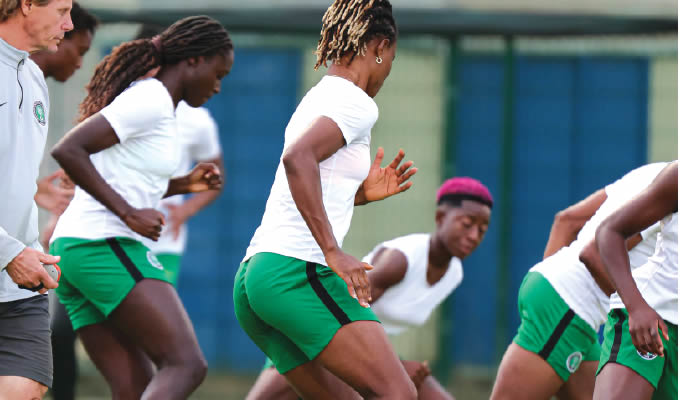The Nigerian women’s national football team, the Super Falcons, encountered an unforeseen logistical hurdle at the 2024 Women’s Africa Cup of Nations (WAFCON) in Morocco. Their newly designed training kits, supplied by Nike, were held up by Moroccan customs, forcing the team to continue training in their old match jerseys and makeshift training gear throughout the group stages of the tournament. This disruption, while not directly impacting their on-field performance, highlighted the administrative and logistical challenges that can plague even the most established teams in international competitions.
The Nigeria Football Federation (NFF) President, Ibrahim Gusau, initially assured that the issue would be resolved within a few days of the kits’ arrival in Casablanca. However, despite these assurances and efforts made by DHL and the NFF to expedite the customs process, the kits remained inaccessible to the team even after they had completed their group stage matches and advanced to the quarterfinals. This delay underscores the complexities of navigating customs procedures in different countries and the potential for unforeseen delays to impact team preparations.
The delay in clearing the kits became a source of frustration for the team and raised questions about the NFF’s logistical planning. The NFF attributed the delay to the late dispatch of the kits, essentially acknowledging a lapse in their own internal processes. This explanation, however, did little to alleviate the immediate problem faced by the Super Falcons, who were left to make do with suboptimal training gear in a crucial international tournament. While the coaches adapted to the situation, the incident emphasized the importance of meticulous planning and timely execution in international sports logistics.
The situation also brought to light the often cumbersome nature of customs procedures, even for essential items like sports equipment. While each country has its own specific regulations and processes, the delay experienced by the Super Falcons exemplifies the potential for these processes to become bottlenecks, especially when dealing with time-sensitive shipments. The incident serves as a reminder of the need for clear communication and efficient coordination between national football federations, shipping companies, and customs authorities to ensure the smooth flow of essential equipment for participating teams.
Despite the kit debacle, the Super Falcons maintained their focus on the tournament, successfully navigating the group stage and securing a place in the quarterfinals. Their resilience and ability to perform at a high level despite the off-field challenges speak to the team’s professionalism and determination. The incident, however, raises important questions about the level of support provided to the team and whether the NFF’s logistical shortcomings could potentially hinder their progress in future tournaments.
The Super Falcons’ experience with the delayed training kits serves as a valuable lesson in the importance of meticulous planning, timely execution, and effective communication in international sports logistics. It highlights the potential for administrative oversights to create unforeseen challenges that can disrupt team preparations and impact performance. While the Super Falcons managed to overcome this hurdle, the incident underscores the need for national federations to prioritize logistical efficiency and ensure that their teams have access to the necessary resources to compete at the highest level. This includes proactive communication with customs authorities and contingency planning to mitigate potential delays.













